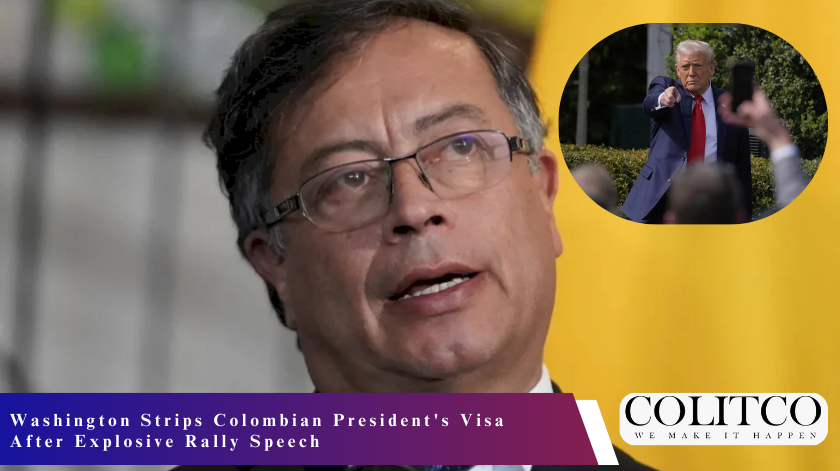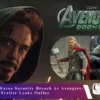The United States has revoked Colombian President Gustavo Petro’s visa following inflammatory remarks he made during a pro-Palestinian demonstration in New York City, escalating diplomatic tensions between the two longtime allies to unprecedented levels.
The State Department announced the visa revocation on Friday evening, citing Petro’s “reckless and incendiary actions” after he urged American soldiers to disobey President Donald Trump’s orders during a rally outside UN headquarters.
The dramatic decision marks only the second time in Colombia’s modern history that a sitting president has lost their US visa privileges, with the last occurrence dating back to 1996.
Controversial Comments Spark Diplomatic Crisis
Speaking through a translator at the demonstration, Petro told the crowd: “I ask all the soldiers of the army of the US not to point their rifles at humanity. Disobey the orders of Trump. Obey the orders of humanity!“
The Colombian leader was in New York attending the UN General Assembly when he joined thousands of pro-Palestinian protesters outside the United Nations building.
Accompanied by British musician Roger Waters, Petro announced plans to present a UN resolution seeking the creation of a “World Salvation Army” whose first task would be the liberation of Palestine.
The State Department’s response was swift and uncompromising. “Earlier today, Colombian president @petrogustavo stood on a NYC street and urged U.S. soldiers to disobey orders and incite violence. We will revoke Petro’s visa due to his reckless and incendiary actions,” the department posted on X.
Earlier today, Colombian president @petrogustavo stood on a NYC street and urged U.S. soldiers to disobey orders and incite violence.
We will revoke Petro’s visa due to his reckless and incendiary actions.
— Department of State (@StateDept) September 27, 2025
Petro Fires Back at Washington
In his defiant response, Petro accused the United States of breaking international law, stating the decision “breaks all the norms of immunity on which the functioning of the United Nations and its General Assembly is based.”
“The fact that the Palestinian Authority was not allowed entry and that my visa was revoked for asking the US and Israeli armies not to support a genocide, which is a crime against all humanity, demonstrates that the US government no longer complies with international law,” he posted on X.
Colombian media reported that Petro had already boarded a flight to leave the US when the State Department announced the visa revocation.
Strained Relations Reach Breaking Point
The visa revocation represents the latest escalation in a deteriorating relationship between the Trump administration and Petro’s left-wing government.
Earlier this year, tensions flared when Petro initially refused to accept US deportation flights, arguing that Colombian migrants were being treated as criminals. The standoff was resolved within hours after Trump threatened 25% tariffs on Colombian imports.
In July, both countries recalled their respective ambassadors amid allegations of a US-backed plot to overthrow Petro’s government, which American officials vehemently denied.
The economic stakes are substantial. The United States maintains a trade surplus with Colombia worth approximately $2 billion annually, making it a crucial export market for American agricultural products.
Historical Precedent and Political Reactions
The last Colombian president to have their US visa revoked was Ernesto Samper in 1996, when the Clinton administration penalised him over alleged drug trafficking ties.
Republican lawmakers responded with harsh criticism of Petro’s actions. Senator Rick Scott posted on X: “Is @petrogustavo, as a guest of OUR COUNTRY, seriously calling for a coup against @POTUS?! Enough is enough. Get Petro & his communist thugs the hell out.”
Is @petrogustavo, as a guest of OUR COUNTRY, seriously calling for a coup against @POTUS?!
Enough is enough. Get Petro & his communist thugs the hell out. https://t.co/X3FU6pOS89
— Rick Scott (@SenRickScott) September 26, 2025
Representative Carlos Gimenez described Petro’s actions as “pathetic,” writing: “Petro once again demonstrates his irresponsibility and his total disrespect toward decent Colombians. Colombia deserves a much better leader!“
Drug War Tensions Complicate Relations
The diplomatic rift comes as Trump recently decertified Colombia as a reliable partner in combating drug trafficking, citing record levels of coca cultivation under Petro’s administration.
Trump blamed Petro’s “failed attempts to seek accommodations with narco-terrorist groups” for exacerbating the crisis, noting that coca cultivation and cocaine production have reached historic levels during his presidency.
Economic Implications and Future Outlook
More than 3,000 Colombian firms export annually to the United States, sustaining roughly 5.8 million jobs both directly and indirectly. American investment in Colombia totalled $1.6 billion in the first quarter of 2025, representing 34% of all foreign direct investment.
The visa revocation doesn’t prevent Petro from attending multilateral forums like the UN General Assembly, where heads of state receive diplomatic access. However, analysts view the symbolic weight of the sanction as considerable.
Colombia, once Washington’s most reliable ally in South America, has pivoted toward China under Petro’s leadership while seeing coca growing zones increase by 70%.
What’s Next for US-Colombia Relations
With Petro’s term ending next year and the leader barred from re-election, candidates may attempt to capitalise on anti-American sentiment or appeal to Trump by campaigning for a tougher approach.
“You have statements and declarations [from the Trump and Petro Administrations] that are not friendly,” said Sandra Borda, an international relations professor at Bogota’s Los Andes University, “and I think what you are going to see is an escalation of that.”
The incident underscores the challenges facing US foreign policy in Latin America as traditional allies increasingly assert their independence, potentially reshaping regional dynamics for years to come.
Also Read: Russia Aids China with Military Equipment for Potential Taiwan Invasion, Think Tank
Frequently Asked Questions
Q: Why did the US revoke President Petro’s visa?
A: The State Department cited his “reckless and incendiary actions” after he urged US soldiers to disobey Trump’s orders during a pro-Palestinian protest in New York City.
Q: When was the last time a Colombian president lost their US visa?
A: In 1996, when President Ernesto Samper’s visa was revoked over alleged drug trafficking ties.
Q: What is the economic relationship between the US and Colombia?
A: The US maintains a trade surplus with Colombia worth approximately $2 billion annually, with American investment totalling $1.6 billion in the first quarter of 2025.
Q: Can Petro still attend UN events?
A: Yes, the visa revocation doesn’t prevent him from attending multilateral forums like the UN General Assembly where heads of state receive diplomatic access.












